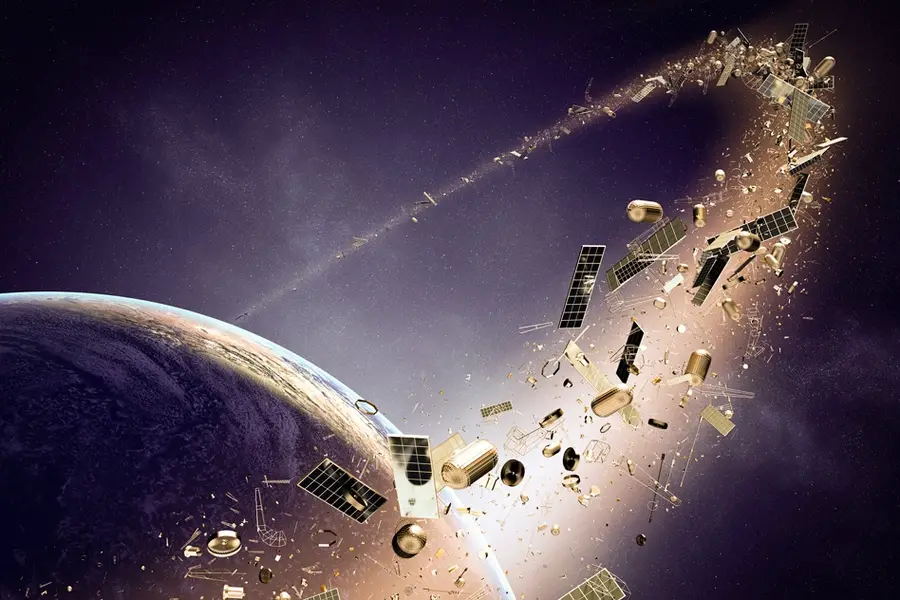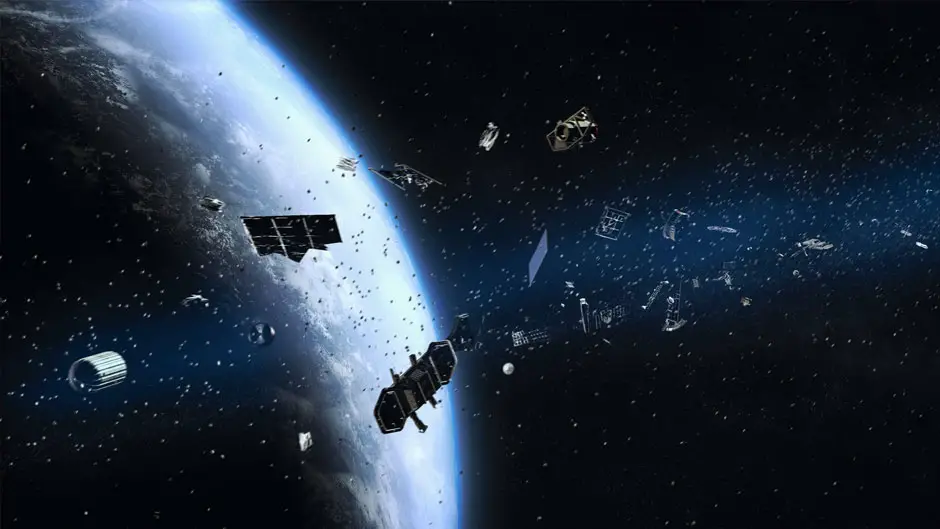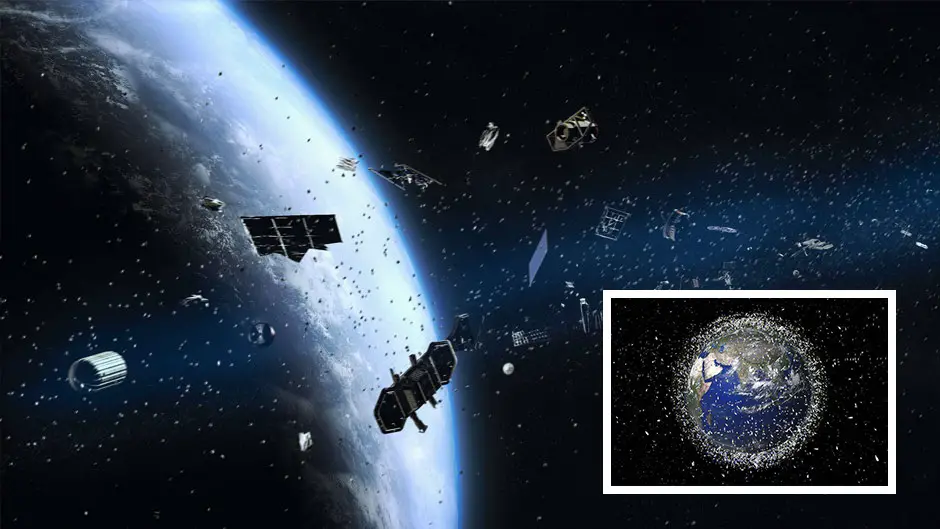The Pentagon wants to de-pollute space. That is, not all of it. At least in low Earth orbit, where hundreds of pieces of junk, wasted rocket stages, and dead satellites swirl about wildly like flotsam.
All of that garbage from decades of space flight is not only unsightly, but it also presents a major threat to a variety of satellites, including those used by the Pentagon and intelligence agencies for national security.
Cleaning a space, on the other hand, is significantly more difficult than cleaning a highway or even an ocean. For one thing, objects in orbit move at a breakneck speed of 17,500 mph, or approximately five miles every second.
Some of them are fiercely tumbling, making it tough to capture them. Launching a spacecraft capable of sidling up to a piece of space debris, catching it, and yanking it out of orbit so it may burn up in the atmosphere is also costly.
Nonetheless, the Defense Department, along with other government departments, has become determined that something must be done as Earth’s orbit gets increasingly congested – and unclean. Even something as little as a screw may serve as a bullet in space, causing massive harm.

A window on the International Space Station has been broken by debris. A micrometeorite slammed through the station’s robotic arm last year, causing a bullet-sized hole. The Pentagon does not want this to happen to one of the satellites it relies on for missile defense, surveillance, or GPS-guided precision bombs.
It just announced Orbital Prime, a program within the US Space Force that would provide seed money to entrepreneurs developing the technologies required to clean up space.
Companies would be awarded $250,000 in the first round of the initiative, with the second round of investment worth up to $1.5 million. The initiative would culminate in an orbital test demonstration.
Gen. David Thompson, the Space Force’s deputy head of orbit operations, claimed the Pentagon monitors more than 40,000 objects in space the size of a fist or bigger in a video promoting the program.
However, he claims that there are at least ten times as many smaller objects in orbit that the Pentagon is unable to detect consistently.
“This debris and accompanying congestion endanger the space domain’s long-term viability,” he warned. “It necessitates action.”
Late last year, the long-simmering problem resurfaced when Russia used a missile to blow up a defunct satellite, resulting in a large debris cloud that endangered astronauts on the International Space Station.
Two Russian cosmonauts, four Americans, and one European astronaut were obliged to board their ship and wait to see whether the station was struck and if they would have to return to Earth. Bill Nelson, the NASA Administrator, labeled it “reckless and hazardous,” and said he was “outraged” by the “irresponsible and destabilizing behavior.”
One of the worries is that the more junk in space, the more debris there will be.

Astroscale is one of the firms that want to be a part of the Orbital Prime program run by the Space Force. The business, which is headquartered in Japan and has a Denver office, is working on a spaceship that it thinks will be able to meet a falling object in orbit, duplicate its spin, and then catch it with a magnet.
It is also collaborating with Japan’s space agency to rendezvous and examine a decommissioned Japanese rocket stage. The stage would be removed from orbit by a second mission, which would be completed by the space agency.
The missions are difficult. The organization came across issues during a test this week. Its spaceship successfully discharged an item into space, but when it tried to maneuver toward it, it encountered a difficulty, or “anomaly.” “We have chosen not to continue with the capture attempt until the anomalies are rectified for the mission’s safety,” the corporation said in a statement on Wednesday.
Nonetheless, it remained confident that a healthy space economy is predicated on cleanliness.
“We aim to build the space economy,” Ron Lopez, president, and managing director of Astroscale U.S., stated. “We want to help facilitate that.” And we want to make sure that we are doing it for the long haul so that future generations may enjoy the environment.”
The White House has also taken notice of the situation. The White House’s Office of Science and Technology Policy recently solicited advice from leaders in the space sector on how to address the issue.
Speaker after speaker emphasized the need of governments throughout the globe to fund these initiatives to assist in the creation of a market for businesses to operate in. They also said that it had become a need for the governments that were mostly responsible for the onset of the crisis.
“If the United States Navy had a derelict ship in sovereign seas posing a safety danger, the United States Navy would go out and seize that ship,” said Doug Loverro, a former senior Pentagon and NASA space official.
“And I am not sure why we do not see the government bear the same accountability for their derelict spacecraft and dead that are floating about in space today.”
“Just as we depend on the government to safeguard the air we breathe and the water we drink, we must rely on the government to maintain the resource and the global commons of low Earth orbit,” says James Lowenthal, an astronomer professor at Smith College in Massachusetts.
Europe and the United Kingdom have also started working on the waste cleanup, which experts believe is long overdue. A contract with the European Space Agency has been signed by Clearspace, a Swiss business, to remove a huge piece of debris, signaling that the problem is finally being handled. It suggests utilizing a spaceship with huge arms that, like a Venus’ flytrap, would grasp the trash.

“This is why we are here,” says the narrator. Because we believe change is achievable,” stated Luc Piguet, co-founder, and CEO of Clearspace. “And we believe we can create a space business that follows a new paradigm, where maintenance is a natural part of the process.”
Others, however, argue that the effort will need to expand and include international cooperation since the United States, Russia, and China are responsible for the majority of the debris.
If governments do not act quickly, there will be collisions — or conjunctions, as they are known — that will further pollute space. And, although the Pentagon can detect objects in orbit and alert satellite operators to a high risk of collision, it lacks the ability to compel anybody to shift their satellite.
Meanwhile, the frequency of near misses has increased. A miss, on the other hand, does not attract much notice.
“There are many near-misses, and people might say, ‘It is not a big issue.'” Darren McKnight, a senior technical fellow at LeoLabs, a business that monitors space objects, remarked, “See, we are robust.” “No, you were quite fortunate. Statistics will eventually catch up with you. And you will roll the dice, and one of these times they will come up snake eyes.”
McKnight collaborated with a group of experts from across the globe to determine the top 50 most hazardous huge items — discarded satellites and rocket stages from the United States, Russia, and China — that are most likely to collide with other debris.
He described them as “the size of a yellow school bus.” “The only difference is that they do not have brakes or a steering wheel, and they are traveling 15,000 mph.” “Within a short height area, which we term the nasty neighborhood,” there are 18 expended Russian rocket stages.
That area is roughly 500 miles up, densely populated with massive objects that will remain aloft for years, if not decades, with each rotation of the Earth giving a new opportunity for a collision. Cleaning it up is a massive and tough undertaking, but one that the US, Russia, and China should work together on, according to McKnight.
He said, “It will need leadership.” And a readiness to look beyond local issues. But, in the end, a partnership would be required and in everyone’s best interests: “Why can not we cooperate to clean up what we collectively fouled up?”
Source: WSJ

